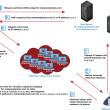Cybersecurity continues to be a hot topic, both for business and organizations trying to protect themselves and for investors looking to cybersecurity providers as significant growth opportunities right now and well into the future.
Below are some of the major cybersecurity trends affecting cybersecurity stocks in 2021.
Growing Threat of Cybercrime
Cybercrime is one of the major themes dominating headlines in business and financial publications around the world. High-profile intrusions, thefts and extortions are on the minds of business leaders in ways that they haven’t been for some time, and perhaps never have.
What’s more, the remote work revolution precipitated by the 2020 pandemic has dramatically increased the rate of digital transformation in organizations across industries. The adoption and integration of new software and internet-enabled technology create a multitude of new vulnerabilities and entry points for cybercriminals looking for easy money.
The malware, and particularly ransomware attacks taking advantage of all of this digitization, also look to be changing in nature, if not intent.
In 2021, the “spray and pay” nature of modern ransomware attacks, where criminals simply fire out as much malware as possible in the hopes of entangling a target, appears to be evolving towards a model whereby hacking and malware groups go after bigger fish in the hopes of landing a bigger payday.
A recent report from Cybercrime publication Cybersecurity Ventures contends that cybercrime will cost the world 6 trillion dollars this year, double the losses from cybercrime in 2015. With so many threats to businesses, government entities and individuals, talk about the need for better cybersecurity measures at all levels of society, as well as increased cybersecurity awareness, is music to the ears of cybersecurity providers and those invested in their companies.
Major Investments by Business and Government
All this talk implies that businesses and governments are naturally looking to significantly increase their cybersecurity budgets and spending. The global market for cybersecurity software, for instance, is expected to grow to nearly 230 billion dollars this year, up from 183.2 billion in 2019. All that money spent on cybersecurity means potentially large profits for some of the biggest players in the industry–companies like Crowdstrike, Gigamon and Fortinet.
Cybersecurity ETFs are also once again popular, with a lot of renewed industry interest following a lacklustre couple of years. It only makes sense that as the demand for the tools required to fortify the world against cybercriminals increases, the companies making and supply those tools (and the investors of those companies) are poised to reap the benefits.
Cyber Warfare and Espionage
Cyberwarfare and espionage was already the geopolitical manoeuvring and harassment method of choice well prior to the pandemic, but the rate at which the Internet of Things (IoT) has increased over the last year, coupled with the expansion of 4 and 5G, the WFH revolution and increased connectivity from those same homes, neighbourhoods and communities, has meant a plethora of new opportunities.
Cyberwarfare is cheap, easy and highly effective. More importantly, it is often hard for one country or state agency to know and prove with certainty where attacks come from and who perpetrates them.
Those cybersecurity companies providing services to national security entities and apparatuses stand to benefit greatly from this, as do their shareholders. Companies with lucrative government cybersecurity contracts will be given large budgets and carte blanche to make all sorts of adjustments and fortifications to new and existing infrastructure.
Conclusion
Investing blogs and communities are hopeful that cybersecurity providers and stocks will rebound in a big way this 2021 on the back of a highly chaotic year and many more on the horizon. As more commerce is done via the internet and internet-connected devices, the criminals will naturally follow.
Just as military tech manufacturers have a field day during a conventional war, cybersecurity manufacturers will likely reap the rewards during the perpetual digital warfare of the future.
Did you enjoy reading this article? Don’t forget to like our page on Facebook and follow us on Twitter!












